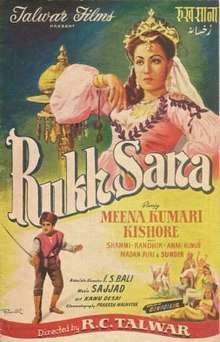Rukhsana (film)
Rukhsana is a 1955 Indian Hindi-language film starring Meena Kumari, Kishore Kumar and Shammi in lead roles. The film was directed by R.C. Talwar who was also its writer and producer.
| Rukhsana | |
|---|---|
 | |
| Directed by | R. C. Talwar |
| Produced by | R. C. Talwar |
| Starring | Meena Kumari Kishore Kumar Shammi |
| Music by | Sajjad Hussain |
Production company | Talwar Films |
Release date |
|
| Language | Hindi |
Plot
The film is a fantasy drama revolving a kingdom ruled by a fickle-minded king (Sunder) whose daughter Rukhsana (Meena Kumari) falls in love with a rebel (Kishore Kumar). The story progresses with an evil vizer (Amar) who not only eyes the throne but also the young princess and makes her life a living hell. In the climax the two lovers overcome all the tribulations and unite again.
Cast
- Meena Kumari
- Kishore Kumar
- Shammi
- Amar
- Sunder
- Kumkum
- Randhir
- Madan Puri (guest appearance)
Crew
- Director – R. C. Talwar
- Producer – R. C. Talwar
- Story – R.C. Talwar
- Cinematography – Prakash Malhotra
- Art Director – Kanu Desai
- Music – Sajjad Hussain
- Lyrics – Shakeel Badayuni, Tanveer Naqvi, Khumar Barabankavi
- Playback Singers – Mubarak Begum, Lata Mangeshkar, Asha Bhosle, Kishore Kumar
Soundtrack
The film had five songs in it. The music of the film was composed by Sajjad Hussain. Shakeel Badayuni, Tanveer Naqvi and Khumar Barabankavi penned down the lyrics.[2]
- "Ye Chaar Din Bahaar Ke" - Asha Bhosle, Kishore Kumar. Lyrics by: Shakeel Badayuni
- "Tere Jaha Se Chal Diye" - Asha Bhosle, Kishore Kumar. Lyrics by: Khumar Barabankavi
- "Tera Dard Dil Me Basa Liya" - Lata Mangeshkar. Lyrics by: Tanveer Naqvi
- "Tere Jahan Se Chal Diye (Female)" - Asha Bhosle. Lyrics by: Khumar Barabankavi
- "Dil Ko Laga Ke Huzur" - Mubarak Begum, Asha Bhosle. Lyrics by: Khumar Barabankavi
- "Din Rat Zafaye Karte Hai" - Asha Bhosle. Lyrics by: Khumar Barabankavi
- "Husn Walo Se Kabhi Ankh" - Mubarak Begum. Lyrics by: Shakeel Badayuni
- "Tumhe Ham Yad Karate Hai" - Asha Bhosle. Lyrics by: Tanveer Naqvi
- "Hume Woh Bahut Yaad Aane Lage Hai" - Lyrics by: Khumar Barabankavi
Reception
The film opened to negative reviews with the critics criticising the stereotypical script. However the lead actors Meena Kumari and Kishore Kumar were praised for their respective performances.[1]
References
- "Rukhsana (1955) - Review". Cineplot. 10 June 2018. Retrieved 10 August 2019.
- "Rukhsana (1955)". Hindigeetamala. Retrieved 10 August 2019.